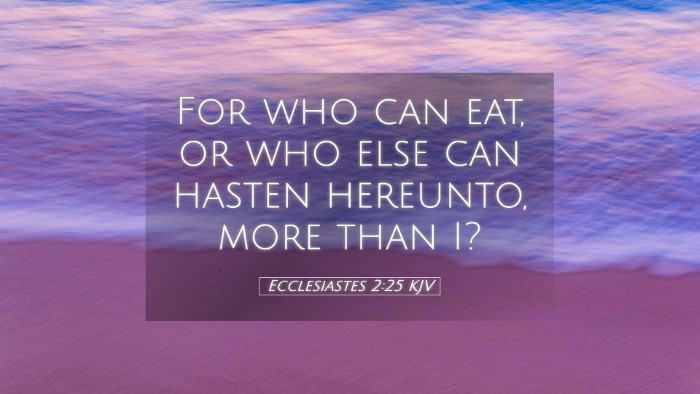Ecclesiastes 2:25 Commentary
Verse: "For who can eat, or who else can hasten hereunto, more than I?" (Ecclesiastes 2:25)
The verse presents a profound reflection on the pursuit of enjoyment and satisfaction in life. It invites readers to examine the nature of human desire and fulfillment, especially in light of the futility that often plagues these pursuits.
Introduction to the Commentary
The book of Ecclesiastes is renowned for its philosophical exploration of the meaning of life, often juxtaposed against the backdrop of vanity and futility. In this particular verse, the Preacher, traditionally understood to be Solomon, expresses a critical inquiry into the nature of human endeavors. The insights garnered from public domain commentaries, such as those by Matthew Henry, Albert Barnes, and Adam Clarke, will be synthesized to provide depth to this verse's understanding.
General Observations
Ecclesiastes 2:25 conveys a significant theme in the text: the quest for true contentment lies beyond mere physical indulgence or the transient pleasures described earlier in the chapter. The preacher poses the rhetorical question about who can truly savor the delights of life, emphasizing a notion of exclusivity and rarity in genuine fulfillment.
Matthew Henry's Insights
Matthew Henry, in his commentary, provides a thoughtful examination of the challenges inherent in finding true joy within the bounds of earthly existence. He suggests:
- Existential Inquiry: The rhetorical nature of the question reflects a deep-seated existential inquiry, indicating that not all can claim the joy of life’s experiences. Henry emphasizes the isolation of experience in regards to fulfillment.
- The Role of Divine Providence: Henry posits that true satisfaction is ultimately a gift from God. “To enjoy the good of our labor is God’s gift,” he writes, stressing the necessity of divine involvement in human satisfaction.
- Limitations of Human Endeavor: The author reflects on the vanity of human pursuits, drawing attention to the ephemeral nature of pleasure. He notes that without a divine perspective, efforts to find joy are often in vain.
Albert Barnes’ Commentary
Albert Barnes offers a detailed exploration of the implications of Ecclesiastes 2:25 in light of the preceding verses:
- Human Appetite: Barnes highlights that the verse addresses natural human appetite and desire. He notes that the pursuit of happiness through consumption and experience is universal but ultimately unsatisfying without deeper fulfillment from God.
- Philosophical Reflection: Barnes places this inquiry within a philosophical framework, arguing that true wisdom acknowledges the limits of satisfaction found in earthly pursuits.
- The Inevitability of Mortality: He reminds readers that pleasure is fleeting and leads to the recognition of life's transience; thus, a relationship with the divine becomes crucial for lasting joy.
Adam Clarke's Perspective
Adam Clarke's commentary complements the insights of Henry and Barnes by offering a practical application of this verse:
- The Search for Contentment: Clarke underlines the idea that many search for contentment in material enjoyment but find themselves dissatisfied. He echoes the sentiment that true contentment stems not from consumption but from relationships and spiritual wholeness.
- Introspection: Clarke encourages deep introspection, prompting readers to ask themselves whether their pursuits align with a divinely ordained purpose, thereby obtaining true fulfillment.
- Ecclesiastes as Instruction: Clarke positions Ecclesiastes as an essential guide for understanding life's fleeting nature and the need to seek eternal perspective rather than temporal satisfaction.
Theological Implications
The theological depth of Ecclesiastes 2:25 cannot be overstated. The insights from the commentaries reveal significant truths about the relationship between humanity, pleasure, and the divine:
- Human Limitations: The verse illustrates human limitations in achieving satisfaction; it suggests that unless one receives enjoyment from God, all endeavors may ultimately lead to frustration.
- Divine Gift of Enjoyment: There exists a profound theological implication that enjoyment and satisfaction are not inherent in the activities themselves but gifted through providential grace, reflecting God’s benevolence.
- Existential Realities: The verse questions existential realities and the human condition, calling individuals to reflect on the fundamental purpose of life in light of eternity.
Conclusion
Ecclesiastes 2:25 serves as a poignant reminder of the complexity of human experience and the often elusive nature of genuine satisfaction. Through the synthesis of insights from esteemed commentators such as Matthew Henry, Albert Barnes, and Adam Clarke, one can appreciate the depth and richness this verse imparts.
For pastors, students, theologians, and scholars, this verse encourages reflection on the true sources of joy and the necessity of divine interaction in human experience.


